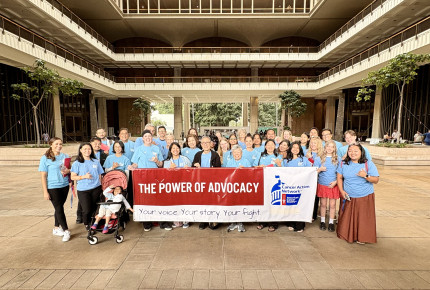Hawaii Survivors, Patients Urge Increased Access to Care During ‘Cancer Action Day’ at State Capitol
 Volunteer advocates, including cancer survivors, patients,
Volunteer advocates, including cancer survivors, patients,
WASHINGTON, D.C. -- March 30, 2009 -- Today the U.S. House of Representatives took an important step in recognizing the importance of colorectal cancer screening with the passage of a resolution honoring the 10th anniversary of the first Congressional designation of March as National Colorectal Cancer Awareness Month. Congress now has the chance to move from awareness to action and pass the Colorectal Cancer Prevention, Early Detection and Treatment Act, H.R. 1189.
H.R. 1189, sponsored by U.S. Reps. Kay Granger (R-Texas) and Patrick Kennedy (D-R.I.), would authorize $50 million for state grants to fund programs to provide colon cancer screenings, information, follow-up services and access to treatment to men and women ages 50 to 64. The grants would focus on those most at risk, such as low-income, uninsured men and women.
The “Colorectal Cancer Prevention, Early Detection and Treatment Act” would bridge the dangerous gap for men and women who are within the recommended age for colon cancer screening but will not have access to screening services at least until they reach Medicare age.
This critical legislation would also train health care providers about how to talk to their patients about the importance of colorectal cancer screening, and support a public education campaign to encourage everyone 50 and older to get this critical cancer screening. As a result, the program would help boost testing rates and save lives.
“When diagnosed at an early stage, colon cancer has a five-year survival rate of 90 percent, but when diagnosed late, the five-year survival rate drops to only 10 percent,” said Daniel E. Smith, president of the American Cancer Society Cancer Action Network (ACS CAN). “Since colon cancer screening could actually prevent cancer by detection and removal of premalignant polyps, the programs initiated by this legislation could avoid suffering due to cancer treatment, reduce the tremendous burden of cancer costs and potentially save thousands of lives by preventing many colon cancer cases and deaths altogether.”
Passage of H.R. 1189 is a priority for ACS CAN which is working to improve access to quality cancer prevention, early detection and treatment for all Americans by making health care reform a top domestic priority. As many as half of all cancer deaths could be avoided every year through proper prevention, screening and early detection.
Also known as colorectal cancer, colon cancer is the third most commonly diagnosed cancer and the second leading cause of cancer deaths. An estimated 148,810 new cases of colorectal cancer were diagnosed in the U.S. in 2008, and an estimated 49,960 colorectal cancer deaths occurred in the same year.
African American and Hispanic men and women are disproportionately affected by this disease having higher colon cancer incidence and mortality rates than whites. Being uninsured or underinsured plays a significant role in these statistics since access often hinders access to colon cancer screening tests, which would detect the disease at an earlier, more treatable stage.
ACS CAN, the nonprofit, nonpartisan advocacy affiliate of the American Cancer Society, supports evidence-based policy and legislative solutions designed to eliminate cancer as a major health problem. ACS CAN works to encourage elected officials and candidates to make cancer a top national priority. ACS CAN gives ordinary people extraordinary power to fight cancer with the training and tools they need to make their voices heard. For more information, visit https://www.fightcancer.org/.
FOR MORE INFORMATION, CONTACT:
Christina Saull
Phone: (202) 585-3250
Email: [email protected]